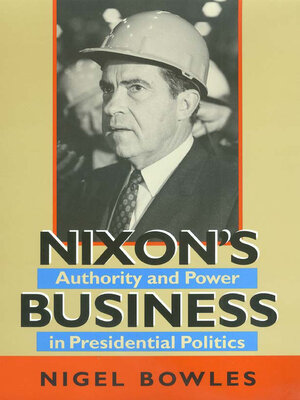Nixon's Business
ebook ∣ Authority and Power in Presidential Politics · Joseph V. Hughes Jr. and Holly O. Hughes Series on the Presidency and Leadership
By Nigel Bowles

Sign up to save your library
With an OverDrive account, you can save your favorite libraries for at-a-glance information about availability. Find out more about OverDrive accounts.
Find this title in Libby, the library reading app by OverDrive.



Search for a digital library with this title
Title found at these libraries:
| Library Name | Distance |
|---|---|
| Loading... |
Richard Nixon considered establishing a strong peacetime economy one of his most important political objectives, [not least for] distinguishing himself from the cautious policies of President Dwight Eisenhower. Using Richard Neustadt's analytical framework of presidential power, Nigel Bowles develops five case studies around President Nixon's economic policies. The thoughtful, insightful analysis goes far to help us understand the sources of Richard Nixon's authority and power, and his use of both.
For each of the "issue-stories" (as Bowles terms them), he considers the president's bargaining advantages: his authority (constitutional and statutory), popular prestige, and personal qualities. He then answers Neustadt's twin questions: "What was the president's inheritance?" and "What was his legacy?"
Bowles's chosen cases represent fiscal policy, wage and price policy, international monetary policy, and domestic monetary policy. Through these analyses, Bowles offers new perspectives on Nixon's use of authority and power; his dealings with and views of senior politicians and power-brokers; his ruthlessness and political ingenuity; the ways his experiences as congressman, senator, and vice president shaped his approach to the presidency; and his subordination of other objectives to his drive for re-election in 1972. He concludes that Nixon used the limited authority he had under the separation of powers to the fullest degree, often thereby augmenting his power in the short-term, but undermining it in the longer-term.
Nixon's Business is the first book to make systematic use of Neustadt's crucial framework in understanding a specific presidency; the first to analyze empirically the components of Nixon's authority and power; and the first to demonstrate the implications of both for understanding the institution of the United States presidency.
For each of the "issue-stories" (as Bowles terms them), he considers the president's bargaining advantages: his authority (constitutional and statutory), popular prestige, and personal qualities. He then answers Neustadt's twin questions: "What was the president's inheritance?" and "What was his legacy?"
Bowles's chosen cases represent fiscal policy, wage and price policy, international monetary policy, and domestic monetary policy. Through these analyses, Bowles offers new perspectives on Nixon's use of authority and power; his dealings with and views of senior politicians and power-brokers; his ruthlessness and political ingenuity; the ways his experiences as congressman, senator, and vice president shaped his approach to the presidency; and his subordination of other objectives to his drive for re-election in 1972. He concludes that Nixon used the limited authority he had under the separation of powers to the fullest degree, often thereby augmenting his power in the short-term, but undermining it in the longer-term.
Nixon's Business is the first book to make systematic use of Neustadt's crucial framework in understanding a specific presidency; the first to analyze empirically the components of Nixon's authority and power; and the first to demonstrate the implications of both for understanding the institution of the United States presidency.







